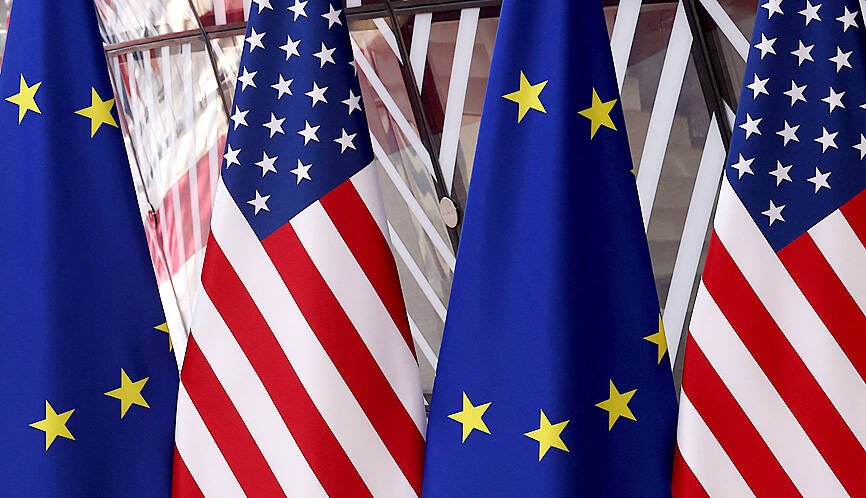The US-European tariff conflict is jeopardizing transatlantic business worth US$9.5 trillion annually, the American Chamber of Commerce to the EU (AmCham EU) warned on Monday.
AmCham EU, whose more than 160 members include Apple Inc, ExxonMobil Corp and Visa Inc, showed in its annual Transatlantic Economy report a deepening relationship hitting records last year, such as goods and services trade of US$2 trillion.
It talks of this year as a year of promise and peril for the world’s largest commercial relationship.

Photo: AFP
In the past week, Washington has imposed tariffs on steel and aluminum, the EU has set out plans for retaliation and US President Donald Trump has threatened 200 percent tariffs on EU wine and spirits.
Trump has railed against the US goods trade deficit with the EU, although there is a US surplus in services, and urged manufacturers to produce in the US.
AmCham said trade is only part of transatlantic commercial activity and that the real benchmark was investment.
“Contrary to conventional wisdom, most US and European investments flow to each other, rather than to lower-cost emerging markets,” it said.
US foreign affiliate sales in Europe are four times US exports to Europe and European affiliate sales in the US are three times higher than European exports.
AmCham warned ripple effects from the trade conflict could damage those close ties.
There was also a risk of spillover into services trade, data flows or energy, with Europe reliant on US liquefied natural gas imports.
“Ripple effects of conflict in the trade space will not be confined to trade. They ripple through all of those other channels and the interactions are quite significant,” the report’s lead author Daniel Hamilton said.
US and European companies had interlinking value chains to be globally competitive, such as BMW AG cars exported from the US.
“I’m not sure you’re going to have isolated investments,” Hamilton said. “That’s just going to make things very inefficient.”
Meanwhile, Trump said he has no intention of creating exemptions on steel and aluminum tariffs, and that reciprocal and sectoral tariffs would be imposed on April 2.
Reciprocal duties on US trading partners would come alongside auto duties, Trump said.

BYPASSING CHINA TARIFFS: In the first five months of this year, Foxconn sent US$4.4bn of iPhones to the US from India, compared with US$3.7bn in the whole of last year Nearly all the iPhones exported by Foxconn Technology Group (富士康科技集團) from India went to the US between March and last month, customs data showed, far above last year’s average of 50 percent and a clear sign of Apple Inc’s efforts to bypass high US tariffs imposed on China. The numbers, being reported by Reuters for the first time, show that Apple has realigned its India exports to almost exclusively serve the US market, when previously the devices were more widely distributed to nations including the Netherlands and the Czech Republic. During March to last month, Foxconn, known as Hon Hai Precision Industry

Taiwan Semiconductor Manufacturing Co (TSMC, 台積電) and the University of Tokyo (UTokyo) yesterday announced the launch of the TSMC-UTokyo Lab to promote advanced semiconductor research, education and talent development. The lab is TSMC’s first laboratory collaboration with a university outside Taiwan, the company said in a statement. The lab would leverage “the extensive knowledge, experience, and creativity” of both institutions, the company said. It is located in the Asano Section of UTokyo’s Hongo, Tokyo, campus and would be managed by UTokyo faculty, guided by directors from UTokyo and TSMC, the company said. TSMC began working with UTokyo in 2019, resulting in 21 research projects,

Taiwan’s property market is entering a freeze, with mortgage activity across the nation’s six largest cities plummeting in the first quarter, H&B Realty Co (住商不動產) said yesterday, citing mounting pressure on housing demand amid tighter lending rules and regulatory curbs. Mortgage applications in Taipei, New Taipei City, Taoyuan, Taichung, Tainan and Kaohsiung totaled 28,078 from January to March, a sharp 36.3 percent decline from 44,082 in the same period last year, the nation’s largest real-estate brokerage by franchise said, citing data from the Joint Credit Information Center (JCIC, 聯徵中心). “The simultaneous decline across all six cities reflects just how drastically the market

Ashton Hall’s morning routine involves dunking his head in iced Saratoga Spring Water. For the company that sells the bottled water — Hall’s brand of choice for drinking, brushing his teeth and submerging himself — that is fantastic news. “We’re so thankful to this incredible fitness influencer called Ashton Hall,” Saratoga owner Primo Brands Corp’s CEO Robbert Rietbroek said on an earnings call after Hall’s morning routine video went viral. “He really helped put our brand on the map.” Primo Brands, which was not affiliated with Hall when he made his video, is among the increasing number of companies benefiting from influencer